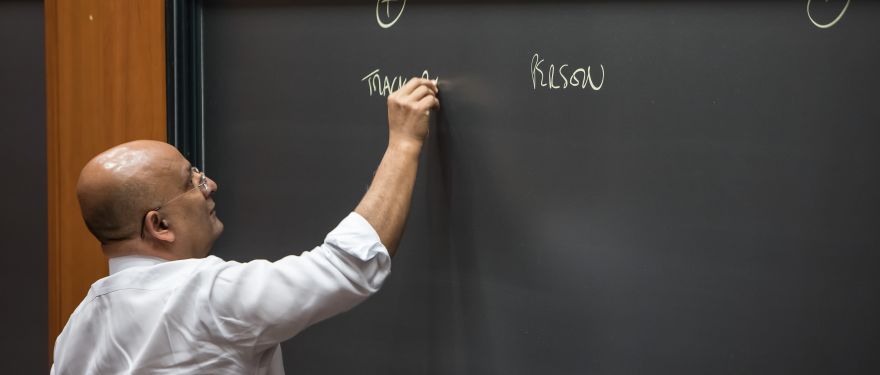Miho Sakuma (MBA '20) is from Tokyo, Japan and graduated with a major in history at Williams College. Prior to HBS, Miho worked in management consulting for Mickinsey in the Tokyo and New Jersey offices.
As a former management consultant, I always found it exciting to meet with CEOs to discuss our recommendations on the company’s most crucial issues. After every such meeting, I always wondered “what is it like to be a CEO, having multiple rounds of these meetings every single day?”
“The Life and Role of the CEO”, one of the Short Intensive Programs (SIPs) offered this January, was a perfect opportunity for me to explore this topic. Led by Dean Nitin Nohria and Professor Kevin Sharer (former CEO at Amgen), we participated in case discussions with current and past CEOs of major public companies to uncover their day-to-day reality.
In comparison to case discussions in a normal semester where we focus on one single decision point, we discussed the CEO as a role. In other words, instead of looking at a snapshot of their life, we took a broader view of their role in terms of topics, stakeholders, and time constraints. This approach taught me that sound decision making itself is not enough; for any decision to work, CEOs need to have built trust with their internal and external stakeholders in advance of important decisions and show continued commitment after the decisions are made.
I had three main questions coming into the class with some hypotheses in mind, and now I have different answers to all of them based on this course. I have laid out below what and how these understandings may be relevant for any roles we play in a company.
-----
1. What is the role of CEO?
Before: The Ultimate Boss, who makes decisions, drives operations, and manages communications
After: The Conductor, who orchestrates the organization to fulfill its mission
While the CEOs do have ultimate power and responsibility, the success of the company depends on their team. To lead effectively, CEOs need to have a strong team and must ask them the right questions to assess realistically the internal and external context, lay out the right course of actions, and interact with internal and external stakeholders to translate strategy into results. One CEO said, “The role of CEO is to define reality and give hope” and “to share credit and take responsibility.” Another said, “I work for the team, not the other way around.” “Being CEO is like being a parent. You give unconditional love and strict limits.” The fact that they always used the word “we” instead of “I” when they talked about their experiences reflected their mindset as a conductor, rather than a boss.
2. What are traits/styles of successful CEOs?
1) Traits
Before: Intelligence
After: Awareness and judgement
Throughout this course, we learned various tensions CEOs need to manage, none of which had a clear right answer (e.g., short-term vs. long term performance; consistent vs. flexible strategy; healthy competition vs. collaborative culture). Becoming a CEO requires increasing flexibility when facing situations one may not know how to handle with constant context switching (e.g., subject matter; the level of detail; kinds of tasks; stakeholders to manage). Also, everything the CEO does is visible, and therefore requires an awareness around the potential signals his or her actions/ inactions are sending. To navigate these tricky situations, CEOs need to have situational and self-awareness, adapt when and how they need to, and make sound judgments– none of which are possible using only pure intelligence.
2) Style
Before: Confident and extroverted
After: Authentic and empathetic
All the CEOs were very confident, but their styles were widely different. One CEO said, “Style does not matter. Behavior does.” For example, rather than trying to be seen as nice to create a superficial psychological safety, it is important to show through action that you care about feedback by actively seeking and responding to it. In fact, one CEO said “being nice runs the risk of showing that you do not care.” Another CEO said, “you need to be able to connect with all the stakeholders on a personal level, and you cannot do it without being authentic to yourself and being empathetic to your team.”
3. How does a CEO keep momentum?
Before: Passion and endurance
After: Desire to do job well and discipline
Given the amount of responsibilities, risks, and pressures that CEOs face daily, how can they bring their A-game every single day for so many years? When students asked this question, most CEOs were a bit surprised. It seemed being motivated at work was so natural to them that they did not even need to ask this question. One CEO said, “I can’t point out one specific thing. I have just been giving my best every single day, and that’s the only way I work.”
This does not mean that doing your best is enough. CEOs also talked about the importance of expectation management, as well as the discipline to manage their energy and time. Here are a few key quotes I took away:
“Total transparency, total trust, and no surprises.” “Think of yourself as a corporate athlete.” “Time is a strategic asset. Manage it with rigor.” “ “You need to be 100% present for every meeting. Have a discipline to forget any preceding meeting.”
----
Through the interactions with the CEOs, I came to respect them not just because of what they have done as CEOs, but because of who they are as people. The accomplishments of the CEOs are impressive (even intimidating), but what I appreciate the most was their authenticity and genuine care for others. I would like to once again thank the CEOs for joining us, Dean Nitin Nohria and Professor Kevin Sharer for leading this course, and my classmates for exploring this topic with me.

